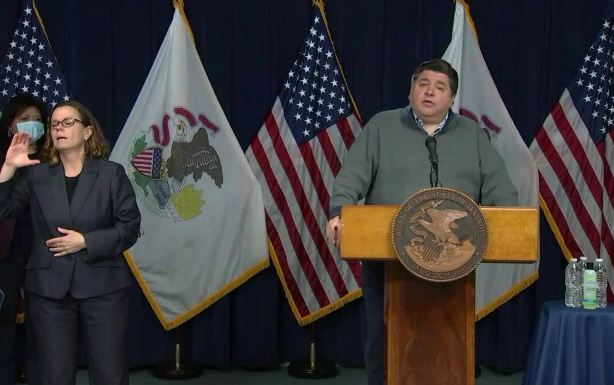CHICAGO – Over 2,000 more coronavirus cases were announced Saturday as the state topped over 200,000 tests performed.
With 2,119 positive tests, the state’s total now stands at 41,777 coronavirus cases. The state lost 79 additional lives to bring its total to 1,874.
After she gave the numbers, Dr. Ezike said she had to address President Trump’s comments about disinfectant.
“Injecting, ingesting, snorting and household cleaners is dangerous,” she said. “It is not advised and can be deadly.”
Dr. Ezike said there have been increased calls to the Illinois Poison Control line over the last two days of people reporting exposure to chemicals.
“Some recent examples include the use of detergent for a sinus rinse and gargling with a bleach and mouthwash mixture in an attempt to kill coronavirus,” Dr. Ezike said.
During Gov. Pritzker’s briefing, he took time to highlight several organizations and volunteers stepping in to help those struggling with things like addiction and mental health.
The Kedzie Center has been inundated with calls.
“We’re hearing from individuals of all ages with increased anxiety, loneliness and grief families who are stressed about basic needs, couples relationship strain and youth who are worried about the safety of their loved ones,” said Dr. Angela Sedano with the center said.
Dr. Sedeno said it’s important to ask for help if you’re struggling.
The Kedzie Center’s number is 773-754-0577.
Text TALK or HABLAR to 552020 to access the Call for Calm emotional support program.
1-833-2FINDHELP for substance abuse help or www.helplineil.org.
The Illinois Poison Control Center’s number 1-800-222-1222.
On Friday, the state topped its goal of 10,000 tests performed in a single day. For the second consecutive day, Illinois tested over 10,000 people.
Thursday, Gov. Pritzker announced an extension of the state’s stay-at-home order through May 30. Some additional essential businesses were named, but others, like barbershops remained closed.
Here are some of the modifications that will be included in Pritzker’s stay-at-home order, which takes effect May 1-30:
PARKS REOPENING: Some state parks will reopen starting May 1, although visitors will still need to follow social distancing guidelines. Fishing and boating in groups of no more than two people will be permitted. Here’s a list of which parks are reopening in Illinois.
GOLF: Golf will be permitted under “strict safety guidelines,” so long as proper social distancing is followed on the course.
NEW ESSENTIAL BUSINESSES: Greenhouses, garden centers and nurseries may re-open as essential businesses. Animal grooming services may also re-open. In addition to following social distancing requirements, they must require employees and customers to wear a face covering.
NON-ESSENTIAL RETAIL: Retail stores not designated as essential businesses and operations may re-open to fulfill telephone and online orders through pick-up outside the store and delivery.
FACE COVERINGS: Beginning May 1, individuals who are over two years old and medically able will be required to wear a face-covering or a mask when in public indoor spaces like stores, or any other public place where they can’t maintain a six-foot social distance.
ESSENTIAL BUSINESSES AND MANUFACTURING: Essential businesses and manufacturers will be required to provide face-coverings to all employees who are not able to maintain six-feet of social distancing, as well as follow new requirements that maximize social distancing and prioritize the well-being of employees and customers. This will include occupancy limits for essential businesses and precautions such as staggering shifts and operating only essential lines for manufacturers.
SCHOOLS: Educational institutions may allow and establish procedures for pick-up of necessary supplies or student belongings. Dormitory move-outs must follow public health guidelines, including social distancing.
HOSPITALS AND SURGERY CENTERS: Surgi-centers and hospitals will be allowed to offer certain elective surgeries for non-life-threatening conditions, starting on May 1. Facilities will need to meet specific criteria, including testing surgery patients to ensure they don’t have COVID-19.


